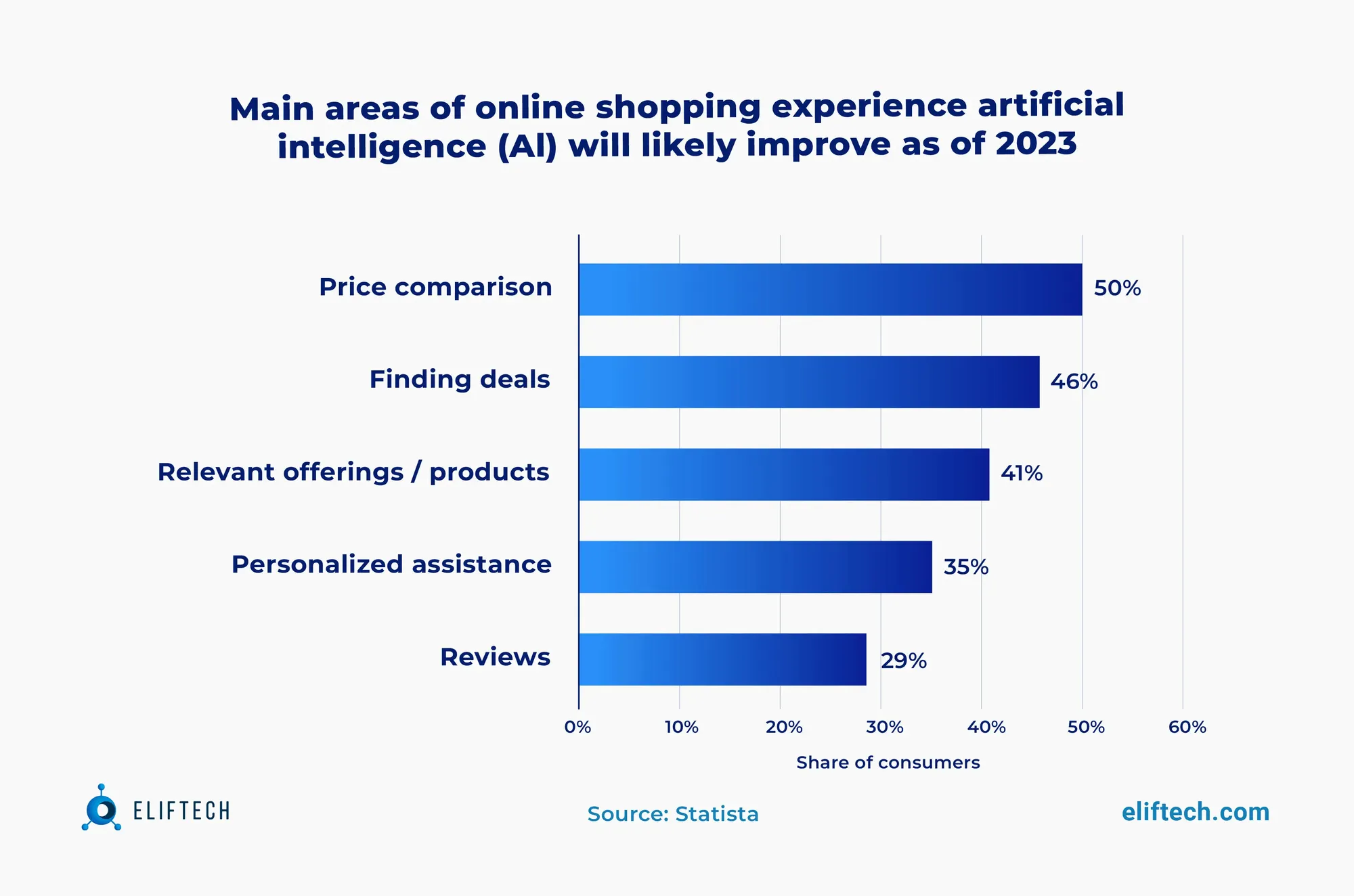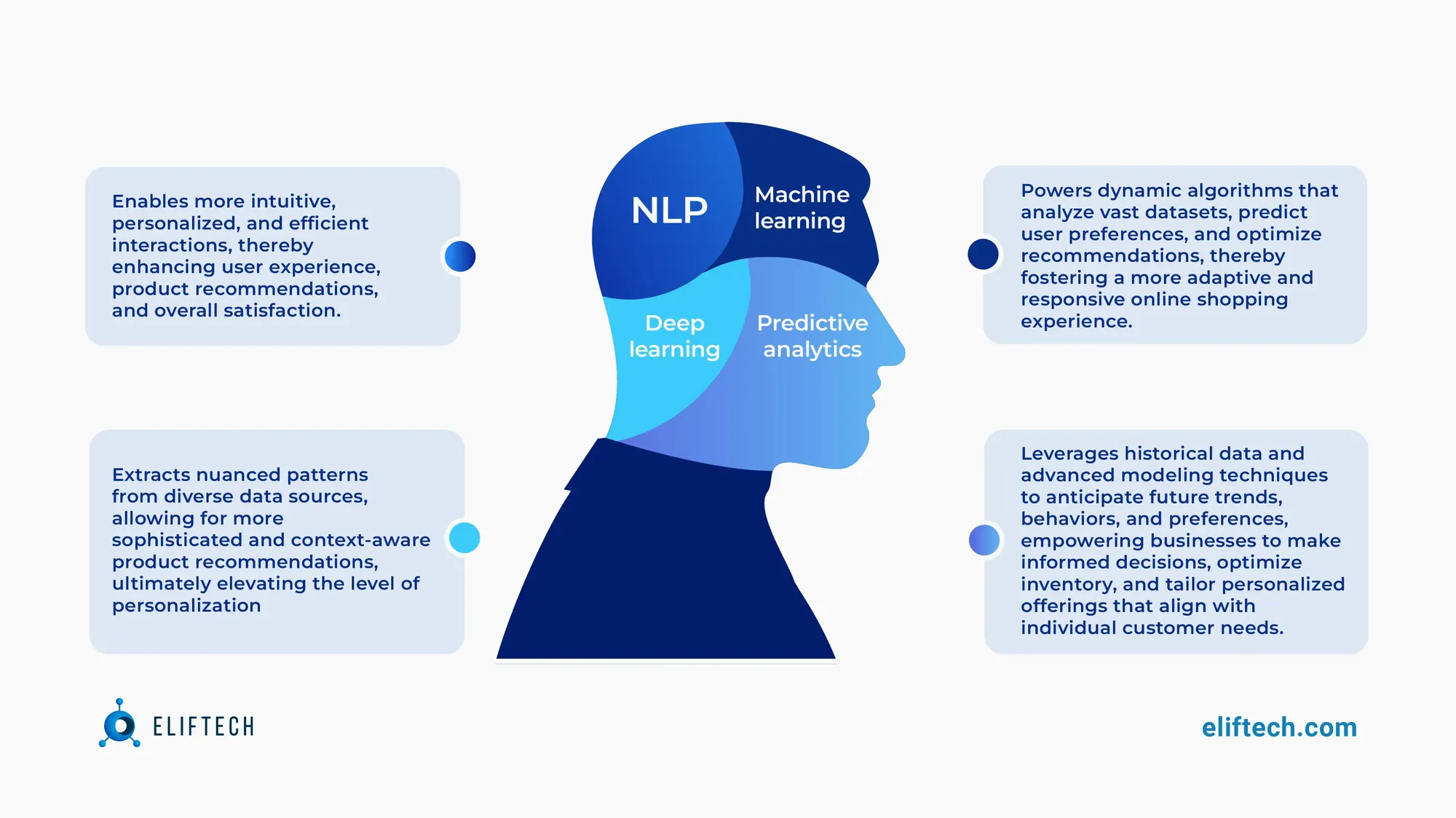AI
AI in Ecommerce: Benefits and Use Cases
It's late at night and you're scrolling through the virtual aisles of your favorite online store. The platform seems to understand your taste and preferences, showing you products that catch your eye, and subtly persuading you to add another item to your cart. It responds instantly to your questions, anticipates your needs, and elevates your shopping experience to a whole new level.
This isn't a retailer's dream, but rather AI in ecommerce, which, according to industry experts, is the architect of a new, personalized ecommerce experience. Behind this seamless interaction is a robust web of AI algorithms, tirelessly decoding patterns, predicting behavior, and personalizing your experience.
From helpful chatbots guiding customers to their perfect product to advanced AI-powered recommendation engines providing smart shopping suggestions – let's explore how AI in ecommerce is revolutionizing the online shopping landscape.
Why is now the time for AI in ecommerce?
It's in our phones, it's in our homes, it even helps us around in the grocery store – for ecommerce, it’s predicted AI will power up to 95% of all customer interactions by 2025. But it's not just about smart devices and robots – it paves the way for more personalized, efficient, and dynamic ecommerce experiences.
A recent study showed that 73% of customers stated that they appreciate the role of AI and machine learning in making their shopping experience better — it's like they're asking for a personal shopping assistant who understands their distinct tastes and needs. AI, especially its crucial components like Machine Learning and Natural Language Processing, does just that by observing and learning from customer behavior, thereby delivering personalized content and offers. Other AI aspects like Speech Recognition and Computer Vision facilitate accessible voice interfaces and foster innovative features such as visual search and augmented reality.
As for decision-makers, 70% of ecommerce leaders in Europe and North America believe AI boosts personalization. According to Forbes, 78% of ecommerce brands have already implemented AI in their stores. The latter companies showed a good result and have managed to increase their revenues by up to 15%.

Statista offers a notable compilation of the primary areas of online shopping experiences that AI is projected to affect in 2023. A more exhaustive list, however, should appear as follows:
- Personalized content and offers through enhanced ecommerce and customer behavior analysis.
- Real-time recommendations from past purchases.
- Customized customer experiences.
- Efficient inventory management.
- Tailored experiences for customer retention.
- Adaptive dynamic pricing strategies for market changes and customer needs.
How AI components impact customer buying behavior (a few good reasons to use it)
AI is not only enhancing customer interactions but also holds the key to decoding consumer behavior and buying habits, shaping a tailor-made shopping experience that goes beyond expectations. The following technologies carry this influence:

- Natural language processing (NLP), allowing systems to understand human language for personalized interactions.
- Machine learning (ML), enabling systems to learn from past data and tailor recommendations to suit individual preferences.
- Deep learning, a subset of ML, gives AI human-like processing capabilities to analyze customer-related factors, leading to highly personalized, accurate experiences.
- Predictive analytics utilizes statistical algorithms and ML to predict future consumer behavior, underpinning effective personalized marketing efforts.
The deployment of AI technologies significantly impacts various consumer patterns and influences their purchasing behaviors.
Consumer pattern #1: Personalized recommendations drive purchases
Money can't buy customer loyalty; only a rich customer experience can. That's why according to Absolunet, 28% of leading ecommerce businesses have already incorporated AI and machine learning systems into their operations. AI analyzes large datasets to align experiences with individual consumer preferences, influencing purchase decisions.
Consumer pattern #2: Prices impact purchase decisions
With online shopping booming, it’s no surprise that price is a top consideration in consumer purchasing decisions. 61% of shoppers say that price is the most influential factor that impacts their purchasing decisions. Nearly half of online consumers (46%), value ecommerce websites offering comparative product information, including pricing details.
AI helps in automating the price comparison process. It adjusts prices based on demand and stock, influencing buying decisions favorably.
Consumer pattern #3: Acceptance of chatbots is rising
Transactions powered by chatbots will reach a value of $112 billion by 2023. The main advantage of using chatbots is that they can serve as a 24/7 salesperson for your company. They can answer questions about your products and services, process orders, provide follow-up customer service, and much more. Chatbots are capable of handling more than 80% of customer inquiries in real time, which means that you don't need to hire more employees or pay extra for staffing costs.
Consumer pattern #4: Predictive personalization fosters brand loyalty
Customers prefer brands that recognize and remember them, providing relevant offers and recommendations. AI, using predictive capabilities, suggests products based on past interactions, driving purchases and fostering customer loyalty.
9 applications of AI in ecommerce
The benefits of AI in ecommerce go far beyond the hype. Examining some of the key uses of AI, we explore how it contributes to customer retention, increased sales, and a robust bottom line:
1. Customer segmentation
AI empowers businesses to predict customer behaviors by introducing a new level of granularity in segmentation. Traditional methods do not account for the intricacies of individual behaviors. In contrast, AI and ML-driven segmentation can analyze vast data sets from multiple sources, such as browsing history, past purchases, and demographics, to create targeted and flexible customer profiles.
2. Tailored product recommendations
Statistics demonstrate the huge influence AI-driven recommendations have on consumer buying decisions. 63% of consumers consider AI-powered recommendations influential in their purchases.
Customers often experience decision paralysis when shopping online. However, through clustering techniques and analyzing user history in real-time, AI algorithms present massive arrays of products in a specially curated shopping experience. In turn, personalized recommendations, powered by AI, fuel nearly a third of ecommerce revenues. Furthermore, 37% of shoppers return to online stores after benefiting from related product suggestions, signaling that AI-backed recommendations also play a critical role in securing repeat business.
They already do this
Amazon and Netflix set the standard in utilizing AI to enhance customer experiences with precisely curated offerings. Amazon uses AI and machine learning algorithms to scrutinize customer behavior, including their browsing and purchasing patterns, to predict and recommend products for each customer. This has proven extremely successful, with the ecommerce giant attributing nearly 35% of its sales to these recommendations.

According to the same study, 75% of the content viewed on Netflix is also driven by product recommendations. The platform uses customer data like viewing history, search queries, and device type to predict and suggest content that matches each viewer's preferences. Continual testing and optimization of the user experience enables Netflix to perfect its recommendations.

3. Client behavior predictions
Predicting future client actions is one of the most promising capabilities of AI in ecommerce. Deep learning techniques can process historical data on customer interactions, browsing patterns, and purchases to predict future behavior. This allows businesses to anticipate needs, tailor offerings, and trigger preemptive actions, thus fostering a more personalized experience and inducing customer loyalty.
They already do this
Netflix also effectively employs AI to predict client behavior and enhance user personalization. Analyzing users' watch history, ratings, and browsing patterns, the platform creates bespoke content recommendations in its 'Top Picks' and 'Because You Watched' sections.
Netflix's AI also considers when, where, and on which device users watch content, in order to offer refined suggestions. This high level of personalization, based on predicting user behavior, maintains user engagement and reduces churn rates.
4. Smart logistics
AI is already making an impact on ecommerce by helping retailers get products from warehouse to customer faster and cheaper by optimizing route planning, warehouse management, and delivery efficiency. By applying predictive analytics, machine learning algorithms can generate accurate demand forecasts, enabling companies to optimize inventory levels and minimize storage costs.
They already do this
Alibaba's subsidiary, Cainiao Network, effectively leverages AI for smart logistics, transforming their ecommerce operations. Analyzing vast data sets—including historical shipment information, traffic, and weather patterns—Cainiao's AI determines the most efficient routes, significantly reducing shipping times and costs.
Their AI-driven demand forecasting system also enables optimal inventory management, ensuring efficient product allocation across warehouses. As a result, Alibaba can maintain optimal stock levels while reducing storage costs. Alibaba reduced logistics errors by 40% with AI.
5. Inventory management and pricing
AI plays a pivotal role in reducing warehousing and forecasting errors by 30-50%, as stated by IBM. AI's power of predictive analytics eliminates inventory dilemmas, preventing overstocking and understocking situations. As for pricing, AI can conduct in-depth market trend analysis and competitor pricing study, enabling dynamic pricing tactics that drive both sales volume and margin.
They already do this
Zara, the global fashion retailer, also effectively employs AI for inventory management and pricing. By analyzing sales data in real-time, Zara's advanced algorithms optimize inventory, preventing overstocking or understocking. Their use of Radio Frequency Identification (RFID) technology provides real-time inventory tracking.
Zara also uses AI to analyze market trends, competitor pricing, and customer sentiment, leading to dynamic pricing adjustments that enhance competitiveness and optimize sales.
A remarkable fact is that Zara's deployment of AI and analytics in its supply chain enables the company to design, produce, and deliver a new product to stores in just 15 days.
6. Voice assistants and chatbots
With the rise of voice commerce, AI-enabled voice assistants and chatbots are ushering in a new way of shopping. Survey suggests that 74% of consumers have used a voice assistant for product research and purchase. These virtual assistants not only create a more engaging shopping experience but also reduce the customer service burden, freeing up resources for strategic tasks.
They already do this
Amazon's virtual assistant, Alexa, allows Amazon customers to add items to their cart, make purchases, and even track packages using just their voice. By simplifying the shopping process, Alexa creates a more engaging and seamless customer experience.
On the other hand, Amazon also deploys AI chatbots for customer service. These chatbots can handle common customer inquiries, provide product recommendations, and assist in resolving issues. This reduces the customer service burden while ensuring 24/7 support availability.
7. Streamlining search with AI
Visual search, another AI innovation, accelerates the product discovery process. Customers can upload images of desired items and receive similar product suggestions, resulting in a smoother shopping experience. With the number of visual searches increasing, it's evident that AI-powered visual search can stimulate sales by reducing barriers to purchase.
They already do this
ASOS's AI-driven visual search tool allows customers to upload images of clothing or accessories they are interested in and instantly receive suggestions of similar available items on the platform. This streamlines the product discovery process and saves time for customers who may not know how to describe the desired item using text searches.
Furthermore, ASOS also utilizes AI for personalized recommendations based on customers' browsing and purchase history to drive conversion.

8. Sales, demand forecasting
The cutting-edge machine learning algorithms of AI can help businesses forecast sales and product demand with increased accuracy. By accurately predicting future sales, businesses can fine-tune their supply chain management strategies, resulting in cost efficiency, improved resource allocation, and increased profitability.
9. Auto-generated product descriptions
AI algorithms can also auto-generate product descriptions. By leveraging natural language processing (NLP), these algorithms can create informative and persuasive descriptions that drive conversions while ensuring quality, consistency, and compliance with brand guidelines. These AI-generated descriptions can save businesses manual effort and provide scalability during high-volume periods.
Who’s already done it:
Alibaba utilizes AI algorithms encapsulating natural language processing (NLP) and machine learning to auto-generate unique and personalized product descriptions for its vast inventory. The AI draws upon item information and historical data to tailor descriptions that match consumer preferences and search behaviors.
Future applications of AI in ecommerce
Voice commerce
As voice-activated devices and AI-powered digital assistants become more advanced and prevalent, customers will increasingly choose to shop via voice commands. This development enables consumers to effortlessly search for products, ask questions about product features, and make purchases without lifting a finger.
Virtual reality (VR) and augmented reality (AR)
By combining AI algorithms with immersive technologies, customers will be able to "experience" the products before making the purchase. For example, they could virtually try on clothing, walk through a digitally recreated showroom, or visualize products in their living space to ensure compatibility with existing décor.
Fraud detection and prevention
The growth of ecommerce has also seen an unfortunate rise in online fraud attempts. By leveraging advancements in AI, businesses can enhance their ability to safeguard customer transactions and protect sensitive data. AI-powered fraud detection algorithms can analyze vast amounts of real-time and historical data to identify abnormal transaction patterns, flag potentially fraudulent activities, and prevent unauthorized transactions.
AI isn't just changing the ecommerce landscape; this versatile technology is making waves across various industries. One such sector where AI has been monumental is fintech. Curious about how AI is applied in fintech? Then, you might also be interested in how AI is shaping the fintech Industry.
How to implement artificial intelligence in ecommerce
The power and potential of AI in revolutionizing ecommerce is inarguably vast, but it isn't a silver bullet. The journey to leverage these technologies demands a well-thought-out strategy, technical finesse, and consistent fine-tuning. We compiled a roadmap on how to successfully incorporate AI into your ecommerce business:
1. Understand your business needs
Before diving into the world of AI, it's crucial to define your business needs and objectives. What problem do you aim to solve? How can AI contribute to your brand's value proposition? Answer these questions to determine your AI investment's potential returns.
2. Identify the suitable AI technology
Depending on your specific business needs, you can choose from a variety of AI technologies. For instance, if your focus is on improving customer service, AI chatbots would be beneficial. If you're looking to analyze consumer behavior for better personalization, predictive analytics or machine learning might be more appropriate.
3. Collaborate with AI developers/experts
Implementing AI in ecommerce requires technical expertise. Hiring a team of skilled AI developers or working with an experienced AI solutions provider can drastically improve your AI integration process.
For example, our engineers craft AI solutions explicitly tailored to meet ecommerce dynamics and needs. You may explore our comprehensive list of AI development services.
4. Test and implement AI tools
Before a full-scale implementation, it's vital to test AI tools in a controlled environment and tweak them as needed. This testing phase can help you understand the strengths and weaknesses of the tools and apply necessary adjustments before launching them officially.
5. Train your staff
Your staff must be trained to use AI tools effectively. Whether it’s the marketing team learning to interpret machine learning-generated consumer insights or the customer support team learning to manage AI chatbots, enabling your staff with the necessary skills will ensure the successful application of AI in your business.
6. Gather feedback and iterate
Once your AI tools are up and running, collect feedback from users to understand how well the tools are meeting their needs and expectations. Continuously refine and improve your AI tools based on this feedback—remember, AI technology operates on a learning loop, getting smarter and more accurate over time.
7. Privacy and security measures
Considering the vast amount of data handled by AI algorithms, data privacy and security measures should be a priority. Understand global data protection regulations like GDPR, and make sure your AI tools follow these guidelines to protect your customers’ data.
How ecommerce can reinforce strategy with AI
Pepijn Rijvers, CMO of Booking.com, underscores the future with his insight, “There won’t be any business in 50 years that won’t be a software business. Businesses won’t be able to afford not to make data-driven decisions”.
Artificial Intelligence is not just a helpful tool but a strategic bedrock for businesses. AI developers and experts help businesses identify operational aspects open to AI optimization. They craft an AI-led strategy that not only streamlines operations but also enhances customer satisfaction and competitive advantage.
For startups, AI pioneers help navigate the AI landscape, developing applications that optimize processes and foster an early competitive edge.
Established businesses also tap into AI's power, modernizing existing solutions, automating routine tasks, improving overall efficiency, and enabling the integration of third-party AI tools. The influence of AI isn’t just confined to broad sectors but permeates even niche areas like shoe ecommerce, highlighting AI's wide scope.
At ElifTech, we harness AI to transform ecommerce operations. Our services include:
- AI product consulting
- AI-powered mobile and web applications
- AI solution support and optimization
- AI audit and reengineering
- Routine tasks automation
- Third-party AI integrations
To discover more about how your business can capitalize on AI capabilities, you can schedule a free consultation with their experts. This will provide deeper insights into how AI implementations can be specifically customized for your unique business situation.
Browse our case studies and get actionable insights to drive your success
See more
